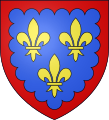Charles de Valois, duc de Berry
Charles de Valois (German also Karl von Valois , born December 28, 1446 in La Riche , † May 24, 1472 in Bordeaux ) was the youngest son of King Charles VII of France and his wife Marie d'Anjou and the only surviving brother the father's successor Ludwig XI.
He was born in the castle of Plessis-lès-Tours .
After the death of his father in 1461, his brother Ludwig XI furnished him. with a Paragium . He got the Duchy of Berry , whereby he became peer of France . Since Charles was dissatisfied with this share of the inheritance, he joined the uprising of Charles of Charolais and his League for the Common Good ( Ligue du Bien public ). In 1465 the king made the peace of Conflans with the rebels and in this context allowed Charles to exchange Berry for the Duchy of Normandy .
Charles found himself unable to consolidate control of the Duchy of Normandy and came into conflict with his former ally, Francis II of Brittany . Louis XI. then had Normandy occupied by royal troops, Charles fled to the court of Francis II, with whom he was reconciled. He remained in exile until 1468, when Franz II and Louis XI. made peace in Ancenis .
In the Peace of Péronne between Louis XI. and Charles of Charolais (now Duke of Burgundy), Charles received the Champagne and the Brie in 1468 . In 1469 he exchanged these possessions and his claims to Normandy for the Duchy of Guyenne .
Charles succumbed to a poison attack in Bordeaux in 1472. He was buried there in the Saint-André cathedral. He was single and left no legitimate heirs. After his death, his lands became part of the Crown Domain .
coat of arms
| predecessor | Office | successor |
|---|---|---|
| Charles I. |
Duke of Berry 1461-1465 |
French crown domain |
| French crown domain |
Duke of Normandy 1465–1466 / 69 |
French crown domain |
| French crown domain |
Duke of Champagne 1468–1469 |
French crown domain |
| French crown domain |
Duke of Guyenne 1469–1472 |
French crown domain |
| personal data | |
|---|---|
| SURNAME | Charles de Valois, duc de Berry |
| ALTERNATIVE NAMES | Charles of Valois |
| BRIEF DESCRIPTION | Duke of Berry, Normandy, Champagne and Guyenne |
| DATE OF BIRTH | December 28, 1446 |
| PLACE OF BIRTH | Plessis-lès-Tours castle |
| DATE OF DEATH | May 24, 1472 |
| Place of death | Bordeaux |



